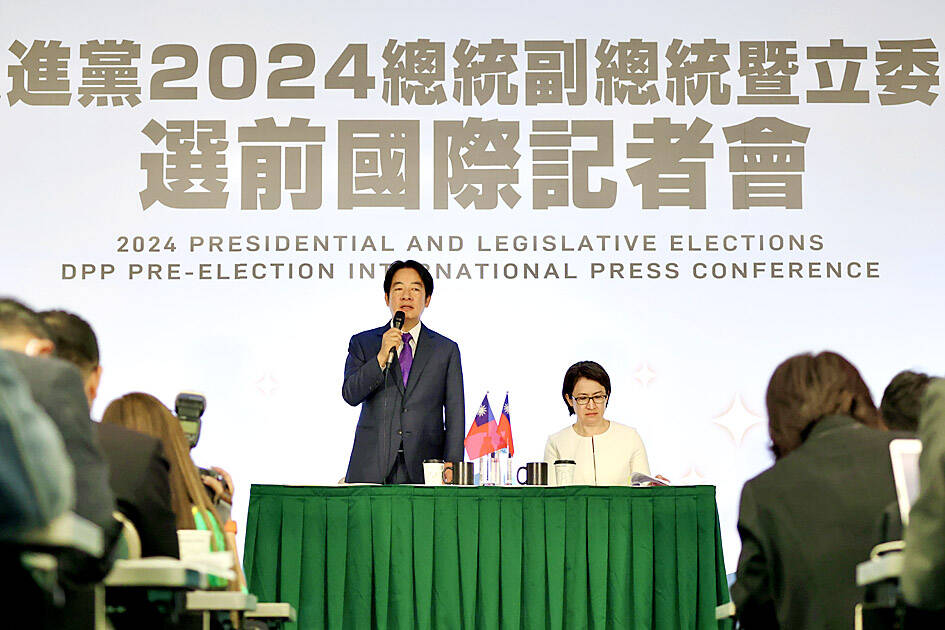Vice President William Lai (賴清德), the Democratic Progressive Party’s (DPP) presidential candidate, yesterday said that he would maintain the “status quo” and pursue peace through strength if elected, remaining open to engagement with Beijing under the preconditions of equality and dignity.
Lai pledged to try to engage with China, as dialogue could decrease cross-straits risks, and said peaceful development is in the best interests of both sides and the rest of the world.
“Peace is priceless and war has no winners,” Lai said at a news conference in which he appeared alongside DPP vice presidential candidate Hsiao Bi-khim (蕭美琴).

Photo: Ritchie B. Tongo, EPA-EFE
However, “accepting China’s one principle proposition is not true peace,” Lai said. “Peace without sovereignty is just like Hong Kong. It is fake peace.”
The DPP and the Chinese Nationalist Party (KMT), which traditionally favors closer ties with China, have committed to bolstering Taiwan’s defenses.
Both say only Taiwan’s 23 million people can decide their future, although the KMT says it strongly opposes independence.
“There is an expectation among the international community that [we] maintain the ‘status quo,’” Lai said, adding that this “is [the responsibility] that both sides of the Taiwan Strait need to bear together.”
“We have no plan” to declare Taiwanese independence, because “the Republic of China, Taiwan, is already an independent sovereign nation,” Lai said.
Lai said that he would continue the policy direction of President Tsai Ing-wen (蔡英文), including efforts to maintain the “status quo” in the Taiwan Strait and expand links with democratic nations.
Lai said that a DPP victory would pave the way for Beijing to “reassess its policy toward Taiwan,” as it would showcase Taiwanese voters’ support for the nation’s current direction and render Chinese interference operations in favor of his opponents futile.
“My being elected would be helpful for creating a new situation in the Indo-Pacific region” that would contribute to the stability of the Taiwan Strait, Lai said.
Lai also said if elected, Taiwan would continue to build up its defense deterrence amid geopolitical tensions. Since the previous election in 2020, China’s People’s Liberation Army has markedly stepped up military exercises around Taiwan.
“The pursuit of peace relies on strength, not the goodwill of the aggressor,” Lai said, vowing to bolster both the military and the economy.
Former representative to the US Hsiao said that facing the restructuring of the global economy, Taiwan — home to the world’s largest contract chipmaker, Taiwan Semiconductor Manufacturing Co (台積電) — must maintain its competitiveness and key position in supply chains.
“In order for Taiwan’s economic strength to grow, it is necessary to integrate with the world,” Hsiao said.
Lai said the election would serve as a “testament to our commitment to democracy,” while also adding that China’s interference in the presidential and legislative elections has been the “most serious” yet.
Additional reporting by CNA

INVESTIGATION: The case is the latest instance of a DPP figure being implicated in an espionage network accused of allegedly leaking information to Chinese intelligence Democratic Progressive Party (DPP) member Ho Jen-chieh (何仁傑) was detained and held incommunicado yesterday on suspicion of spying for China during his tenure as assistant to then-minister of foreign affairs Joseph Wu (吳釗燮). The Taipei District Prosecutors’ Office said Ho was implicated during its investigation into alleged spying activities by former Presidential Office consultant Wu Shang-yu (吳尚雨). Prosecutors said there is reason to believe Ho breached the National Security Act (國家安全法) by leaking classified Ministry of Foreign Affairs information to Chinese intelligence. Following interrogation, prosecutors petitioned the Taipei District Court to detain Ho, citing concerns over potential collusion or tampering of evidence. The

Seventy percent of middle and elementary schools now conduct English classes entirely in English, the Ministry of Education said, as it encourages schools nationwide to adopt this practice Minister of Education (MOE) Cheng Ying-yao (鄭英耀) is scheduled to present a report on the government’s bilingual education policy to the Legislative Yuan’s Education and Culture Committee today. The report would outline strategies aimed at expanding access to education, reducing regional disparities and improving talent cultivation. Implementation of bilingual education policies has varied across local governments, occasionally drawing public criticism. For example, some schools have required teachers of non-English subjects to pass English proficiency

‘FORM OF PROTEST’: The German Institute Taipei said it was ‘shocked’ to see Nazi symbolism used in connection with political aims as it condemned the incident Sung Chien-liang (宋建樑), who led efforts to recall Democratic Progressive Party (DPP) Legislator Lee Kun-cheng (李坤城), was released on bail of NT$80,000 yesterday amid an outcry over a Nazi armband he wore to questioning the night before. Sung arrived at the New Taipei City District Prosecutors’ Office for questioning in a recall petition forgery case on Tuesday night wearing a red armband bearing a swastika, carrying a copy of Adolf Hitler’s Mein Kampf and giving a Nazi salute. Sung left the building at 1:15am without the armband and apparently covering the book with a coat. This is a serious international scandal and Chinese

NEGOTIATIONS: The US response to the countermeasures and plans Taiwan presented has been positive, including boosting procurement and investment, the president said Taiwan is included in the first group for trade negotiations with the US, President William Lai (賴清德) said yesterday, as he seeks to shield Taiwanese exporters from a 32 percent tariff. In Washington, US Trade Representative Jamieson Greer said in an interview on Fox News on Thursday that he would speak to his Taiwanese and Israeli counterparts yesterday about tariffs after holding a long discussion with the Vietnamese earlier. US President Donald Trump on Wednesday postponed punishing levies on multiple trade partners, including Taiwan, for three months after trillions of US dollars were wiped off global markets. He has maintained a 10 percent